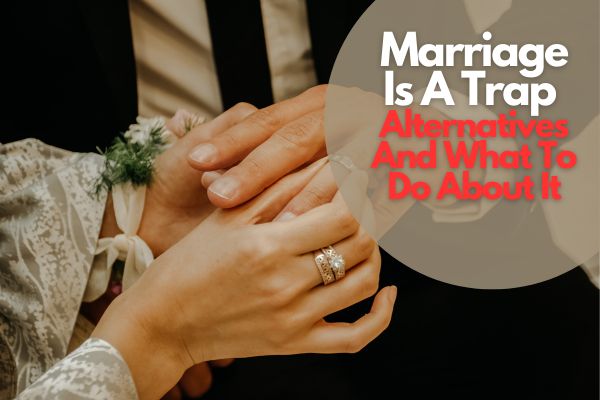Are there hidden downsides to tying the knot? While marriage is often considered a sacred union, it’s worth delving into the controversial idea that marriage can sometimes feel like a trap.
In this thought-provoking exploration, we will examine the potential negative consequences that individuals may face within the institution of marriage. From limitations on personal freedom to hindered personal growth, we’ll shed light on the aspects that challenge the conventional notions of wedlock.
Do you want to know if marriage is a trap? Join us as we delve into the complexities of marriage and the arguments surrounding its potential drawbacks.
Marriage Is A Trap?
Marriage, traditionally viewed as a joyous and fulfilling union, can sometimes have detrimental effects on individual freedom, personal growth, and overall happiness.
While it is important to acknowledge that not all marriages result in negative outcomes, there are circumstances where individuals may feel trapped within the confines of the institution.
One significant concern is the potential loss of individual freedom. Marriage often involves compromises and shared decision-making, which can limit personal choices and autonomy.
Individuals may find themselves obligated to consider their partner’s opinions and desires when making important life decisions, potentially sacrificing their own goals and aspirations in the process. This loss of personal agency can lead to a sense of confinement and hinder the pursuit of individual passions and interests.
Moreover, marriage can also stagnate personal growth. Committing to a lifelong partnership may restrict opportunities for self-discovery and exploration.
The responsibilities and commitments that come with marriage can demand a significant amount of time and energy, leaving little room for personal development and self-actualization. This lack of flexibility and independence can hinder an individual’s journey toward discovering their true potential and achieving personal growth.
Additionally, unrealistic expectations and societal pressure can contribute to the feeling of being trapped in a marriage. Society often imposes traditional gender roles and norms within the context of marriage, pressuring individuals to conform and meet certain expectations.
The expectation of constant companionship and emotional support may lead to a sense of suffocation, as individuals may desire personal space or pursue their own interests outside the marriage. These expectations can create internal conflicts and a sense of dissatisfaction, ultimately impacting overall happiness.
Emotional and financial burdens can also add to the perception of marriage as a trap. Marriage comes with increased responsibilities and obligations, such as managing household finances, raising children, and maintaining a stable home environment.
These added burdens can lead to emotional stress, potential conflicts, and a loss of personal freedom. Furthermore, financial implications can arise, including shared financial assets and potential loss of financial independence, which can further contribute to a sense of entrapment.
It is important to note that alternative forms of relationships, such as cohabitation or open relationships, have gained recognition as valid options for companionship and commitment.
These alternatives prioritize personal freedom, individual happiness, and growth, allowing individuals to maintain a sense of independence and fulfillment while navigating intimate relationships.
In conclusion, while marriage can bring love, companionship, and stability, it is crucial to recognize its potential negative consequences on individual freedom, personal growth, and overall happiness. By critically evaluating the institution of marriage and exploring alternative relationship models, individuals can seek a path that aligns with their personal values and aspirations, fostering a sense of fulfillment and happiness on their own terms.
Factors That Make It Seem Marriage Is A Trap
1. Loss Of Individual Freedom
Marriage often requires compromise and shared decision-making, which can limit individual freedom. Individuals may have to consider their partner’s opinions and desires when making important life decisions, potentially sacrificing their own goals and aspirations.
2. Restriction On Personal Choices
Within a marriage, individuals may face limitations on personal choices, such as where to live, how to spend money, or even what hobbies to pursue. These restrictions can make individuals feel trapped or confined within the boundaries of the relationship.
3. The Sacrifice Of Personal Growth
Committing to a lifelong partnership can sometimes hinder personal growth. The responsibilities and commitments that come with marriage can demand significant time and energy, leaving little room for self-discovery, exploration, and pursuing individual passions and interests.
4. Unrealistic Expectations
Society often imposes traditional gender roles and expectations within marriage, pressuring individuals to conform to specific norms. These expectations can restrict personal freedom and limit opportunities for personal fulfillment outside of traditional marital roles.
5. Emotional And Financial Burdens
Marriage comes with increased responsibilities and obligations, both emotionally and financially. These burdens can lead to stress, potential conflicts, and a loss of personal freedom. Financial implications, such as shared assets or loss of financial independence, can further contribute to a sense of entrapment.
6. Limited Options For Personal Fulfillment
The expectation of constant companionship and emotional support within marriage may restrict personal space and the pursuit of individual interests. This limitation can make individuals feel suffocated or unsatisfied, as they may desire personal growth and fulfillment outside the confines of the marriage.
7. Societal Pressure
Society often places a significant emphasis on marriage as an ideal and expected life goal. This societal pressure can make individuals feel compelled to enter into marriages that may not align with their personal desires or happiness, leading to a sense of being trapped in a situation they did not truly choose.
It is important to note that not all marriages result in these negative outcomes, and many individuals find love, companionship, and personal growth within the institution of marriage.
However, these factors can contribute to the perception that marriage can be a trap for some individuals, highlighting the importance of critically evaluating one’s personal values and aspirations before committing to such a lifelong partnership.
Alternative Relationships For Those Who Think Marriage Is A Trap
1. Cohabitation
Cohabitation refers to a living arrangement where unmarried individuals, often in a romantic relationship, choose to live together under the same roof. This alternative form of relationship allows individuals to experience companionship and intimacy without the legal and societal obligations associated with marriage.
It offers flexibility, independence, and the opportunity to test compatibility before considering marriage.
2. Open Relationships
Open relationships are characterized by consensual non-monogamy, where partners agree to engage in romantic or sexual relationships with other individuals outside of the primary partnership.
Open relationships prioritize honesty, communication, and the freedom to explore connections with others while maintaining a committed bond. This alternative provides individuals with the opportunity for personal growth, varied experiences, and emotional fulfillment.
3. Polyamory
Polyamory involves having multiple loving and consensual relationships simultaneously. It challenges the notion of monogamy by acknowledging that individuals can romantically love and form deep connections with multiple partners.
Polyamorous relationships thrive on open communication, negotiation of boundaries, and mutual respect, allowing individuals to explore diverse emotional connections and fulfill various needs.
4. Solo Living
Solo living refers to consciously choosing to live alone and embracing the benefits of independence and self-reliance. This alternative lifestyle focuses on personal growth, self-discovery, and individual fulfillment without the involvement of a romantic partner.
Solo living allows individuals to prioritize their own needs, pursue personal interests, and develop a strong sense of self.
5. Committed Partnerships Without Legal Marriage
Some individuals opt for committed partnerships without the legal institution of marriage. These relationships prioritize emotional intimacy, shared goals, and long-term commitment, without the legal obligations and potential constraints associated with marriage. This alternative form of relationship allows for flexibility and freedom while maintaining a deep emotional connection.
6. Long-Distance Relationships
In an increasingly interconnected world, long-distance relationships have become a viable alternative for individuals who desire emotional connection and companionship but are geographically separated.
Through modern technology and communication tools, long-distance relationships can flourish, allowing individuals to maintain their individuality and personal growth while nurturing a committed bond with their partner.
7. Friendships As Primary Relationships
Friendships can be seen as alternative primary relationships that provide companionship, emotional support, and a sense of belonging. Some individuals prioritize deep friendships over traditional romantic partnerships, finding fulfillment and happiness in these connections without the constraints and expectations of marriage.
Friendships allow for individual growth, shared experiences, and a supportive social network.
It is important to note that alternative forms of relationships are diverse and unique to each individual. The key is to prioritize open communication, mutual consent, and personal fulfillment when exploring these alternative relationship models.
Conclusion
In reconsidering the notion of marriage as a trap, it becomes essential to acknowledge the multifaceted nature of this institution. While marriage has its merits, it is equally important to recognize the potential drawbacks it can entail.
By critically evaluating societal expectations, limitations on freedom, and stifled personal growth, individuals can make informed choices about their own paths to happiness and fulfillment. This exploration prompts us to embrace alternative forms of relationships that prioritize individuality and personal growth.
Ultimately, by empowering individuals to find happiness on their own terms, we can create a society that values personal fulfillment over societal expectations.







